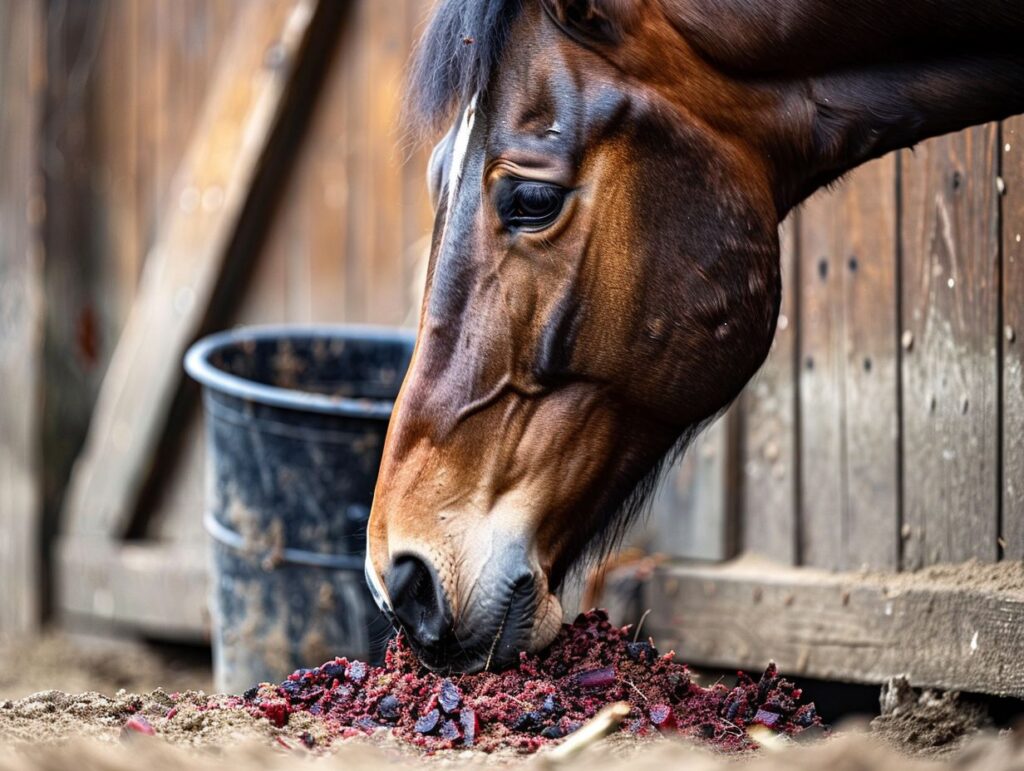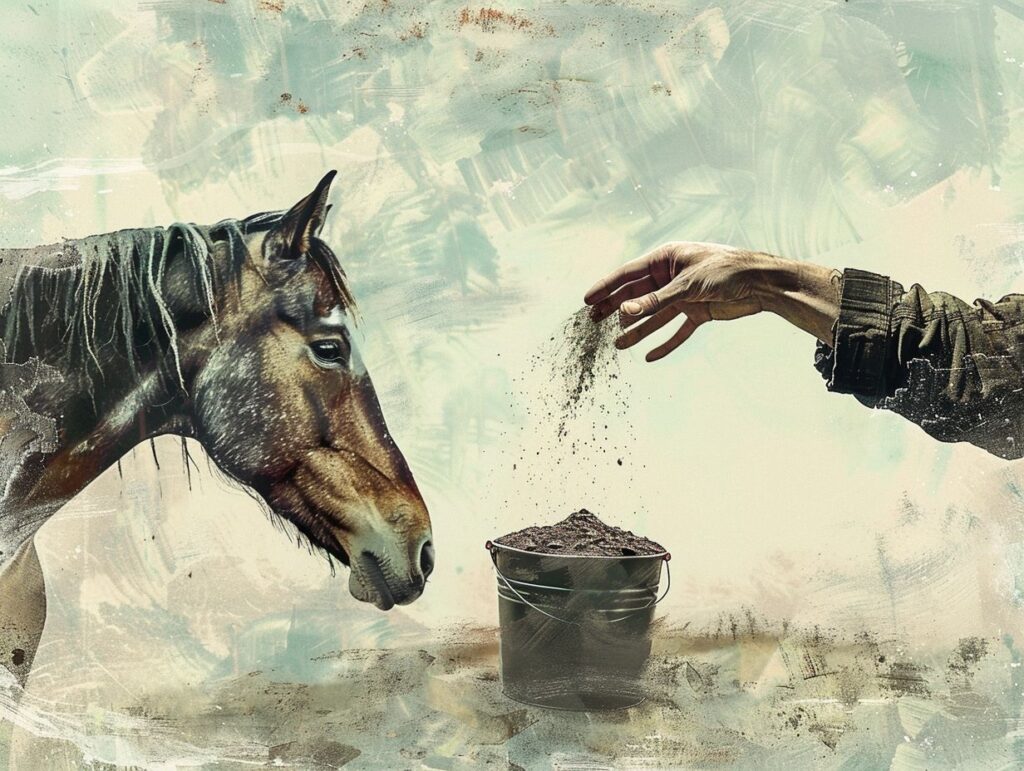Interested in determining whether you should be feeding your horse beet pulp? This article will give you all the information necessary to make a well-informed decision. From an analysis of the nutritional content of beet pulp to the advantages it can provide your horse, all aspects will be addressed.
Furthermore, potential risks and considerations will be explored, along with guidelines on how to safely introduce beet pulp into your horse’s diet. If you’re seeking alternatives, we have you covered with a comparison of various feed choices. Keep reading to expand your knowledge on this topic!
What is Beet Pulp?
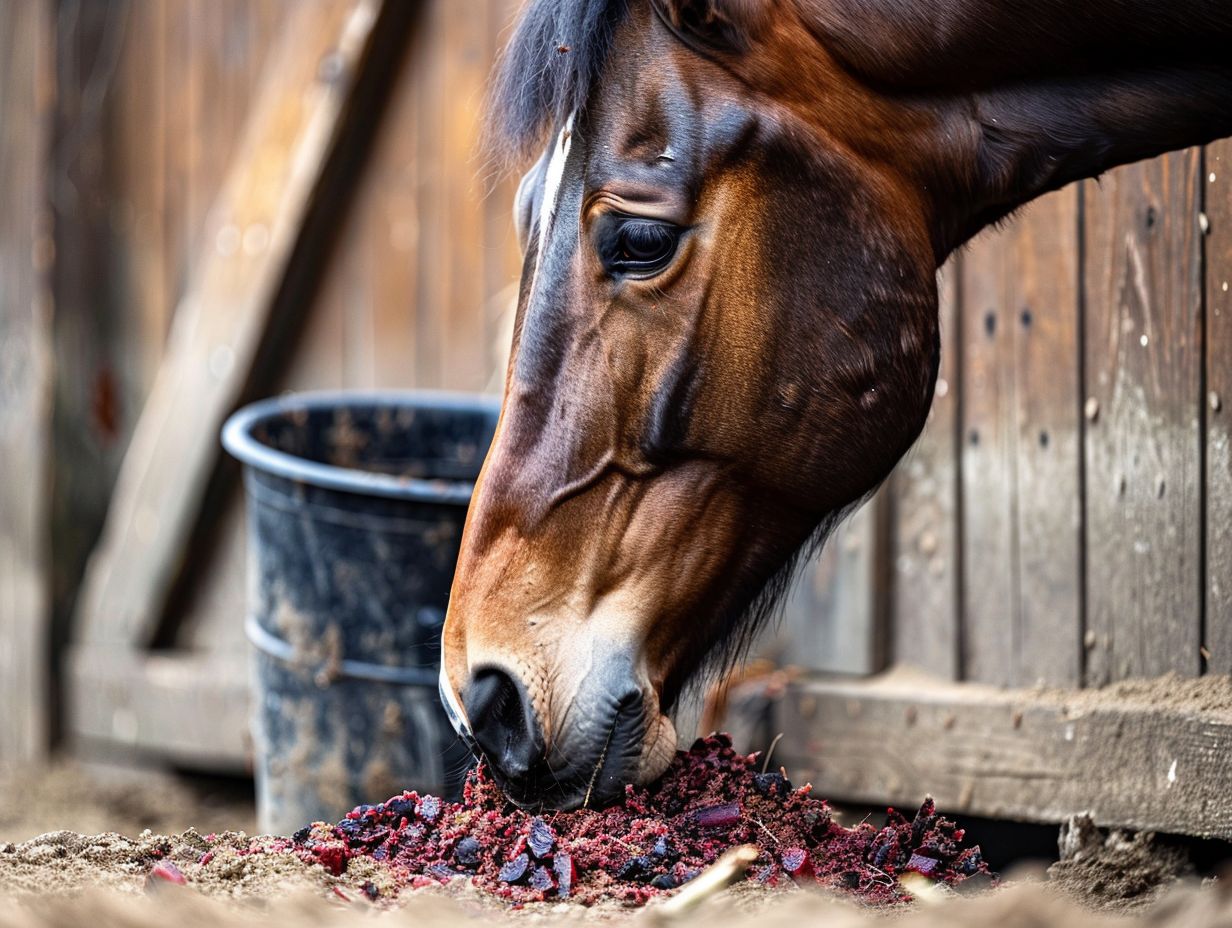
Beet pulp serves as a common fiber-rich feed for horses, originating from sugar beets post-sugar extraction. It is extensively utilized in equine nutrition owing to its high fiber content and digestibility.
Initially viewed as a byproduct of the sugar industry, beet pulp has transitioned into a valuable element in equine diets due to its nutritional value and advantages for horses. The production process entails the drying of residual pulp from sugar beets, followed by shredding and pelletization to facilitate consumption by horses. With its high soluble fiber content, beet pulp aids in fostering a healthy digestive system in horses by supporting beneficial gut bacteria and facilitating proper digestion. This feed source is particularly advantageous for horses grappling with digestive concerns or those requiring additional fiber in their diet.
Overview of Nutritional Composition
Beet pulp is a nutritional powerhouse for horses, providing them with essential dietary fiber, vitamins, and minerals that are crucial for their overall health and well-being. The high fiber content in beet pulp is particularly advantageous for maintaining a healthy digestive system in horses.
Along with fiber, beet pulp also offers a well-balanced mix of carbohydrates, proteins, and fats, making it a valuable addition to equine diets. This fiber-rich feed aids in promoting proper digestion and nutrient absorption, ultimately contributing to the horse’s overall performance and well-being.
Additionally, beet pulp contains important vitamins and minerals such as vitamin A, vitamin E, calcium, and phosphorus, all of which play pivotal roles in supporting various bodily functions and maintaining optimal health in horses.
Benefits of Feeding Beet Pulp to Horses
Including beet pulp in your horse’s diet provides a wide array of advantages, encompassing improved digestion and enhanced nutrient absorption, along with better weight management and overall health. This adaptable feed option is rich in soluble fiber, which plays a key role in the digestion process by fostering a healthy gut environment. By boosting water retention in the digestive tract, beet pulp aids in keeping your horses hydrated, which is particularly crucial during demanding activities.
The unique nutritional composition of beet pulp delivers essential vitamins and minerals that are instrumental in supporting your horse’s overall well-being. When integrated correctly into the diet, beet pulp serves as a valuable supplement, helping to uphold optimal body condition and ensuring that your horses are sufficiently fueled for peak performance.
Improved Digestion and Weight Management
Incorporating beet pulp into a horse’s diet can result in enhanced digestion, improved digestive efficiency, and better weight management, making it a valuable addition to their feeding routine.
By providing soluble fiber, beet pulp plays a key role in regulating the digestive process in horses by fostering the growth of beneficial gut bacteria. This fiber source aids in maintaining a healthy balance in the digestive tract, thereby helping to prevent digestive issues like colic and ulcers.
The high digestibility of beet pulp allows horses to extract more nutrients from their feed, ultimately contributing to improved overall health and performance. Additionally, the presence of fermentable fiber in beet pulp supports a consistent release of energy, enabling horses to maintain steady energy levels throughout the day.
Potential Risks and Concerns
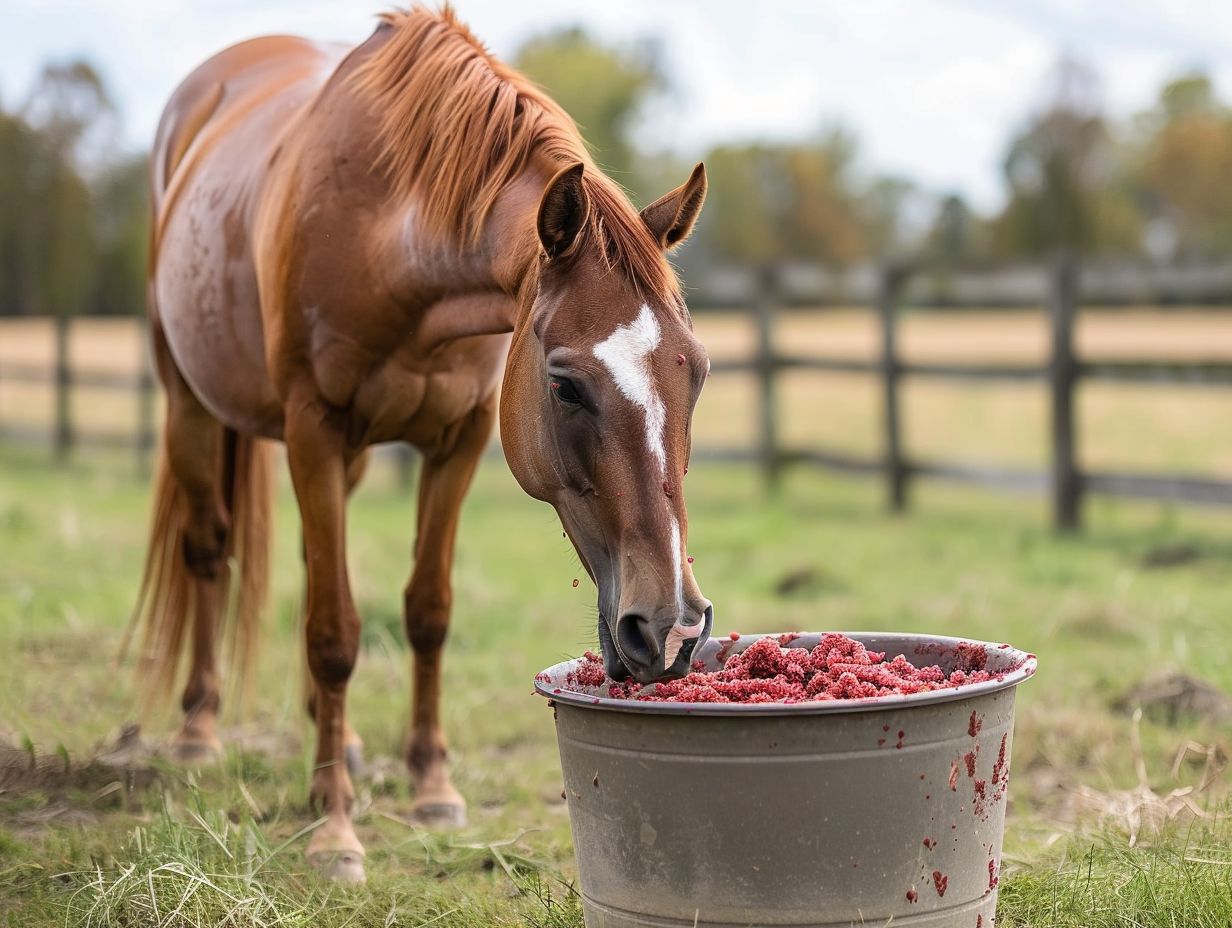
While beet pulp offers numerous benefits, you should be aware of potential risks and concerns associated with its feeding, including digestive issues, allergies, and the need for proper safety precautions.
These risks primarily arise from the high fiber content in beet pulp, which can result in digestive disturbances if introduced too quickly or not adequately soaked before feeding. Some horses may also show sensitivity to beet pulp, presenting symptoms of gastrointestinal upset like colic or loose stools.
To manage these risks effectively, it is crucial to introduce beet pulp gradually into the horse’s diet, starting with small quantities and increasing slowly over time. Always ensure thorough soaking of the beet pulp in water before feeding to prevent the risk of choke, as dry pulp may swell and cause blockages if consumed without adequate moisture.
Possible Allergies and Digestive Issues
Senior horses or those with sensitive digestive systems may be prone to allergies or digestive issues when introduced to beet pulp, necessitating careful monitoring to maintain their digestive balance and function.
It is crucial for you to introduce beet pulp gradually into their diet. Begin with small amounts and increase slowly to allow their digestive systems to adjust. Ensuring access to clean water at all times is vital to prevent dehydration, especially since beet pulp can absorb water in the gut. Observing for signs of colic, loose stools, or any other digestive disturbances is important to promptly address any adverse reactions. Consultation with a veterinarian or equine nutritionist can provide personalized guidance on incorporating beet pulp effectively while prioritizing digestive support for senior horses or those with delicate digestive systems.
How to Incorporate Beet Pulp into Horse’s Diet
Incorporating beet pulp into your horse’s diet can be effectively achieved by adhering to specific feeding guidelines. This includes following proper soaking methods, determining the appropriate serving size, and integrating it into a balanced meal plan tailored to your horse’s specific nutrient profile.
To introduce beet pulp into your horse’s diet, it is recommended to start by soaking the required amount in water for a minimum of 12 hours or overnight. This soaking process allows the beet pulp to absorb moisture, facilitating easier digestion and reducing the risk of choke. When establishing the serving size, it is essential to take into account your horse’s size, weight, and activity level. As a general guideline, it is advisable to begin with small quantities and gradually increase to identify the optimal portion. Develop a feeding schedule that includes beet pulp within your horse’s existing meals to ensure a well-rounded nutrient intake that supports overall health and performance.
Feeding Guidelines and Tips
When incorporating beet pulp into your horse’s diet, it is crucial to follow proper feeding guidelines and tips to ensure optimal hydration, digestibility, and overall well-being.
To achieve this, soak beet pulp adequately as it softens the fibers, making it easier for horses to digest and absorb nutrients efficiently. Proper soaking also helps prevent the risk of choke and ensures your horse remains well-hydrated. By integrating soaked beet pulp into your horse’s feeding routine, you provide a valuable source of fiber that supports gut health and promotes weight management.
Remember to adjust the amount of beet pulp based on your horse’s individual needs and seek guidance from a veterinarian or equine nutritionist to develop a balanced feeding program tailored to your horse’s requirements.
Alternatives to Beet Pulp for Horses
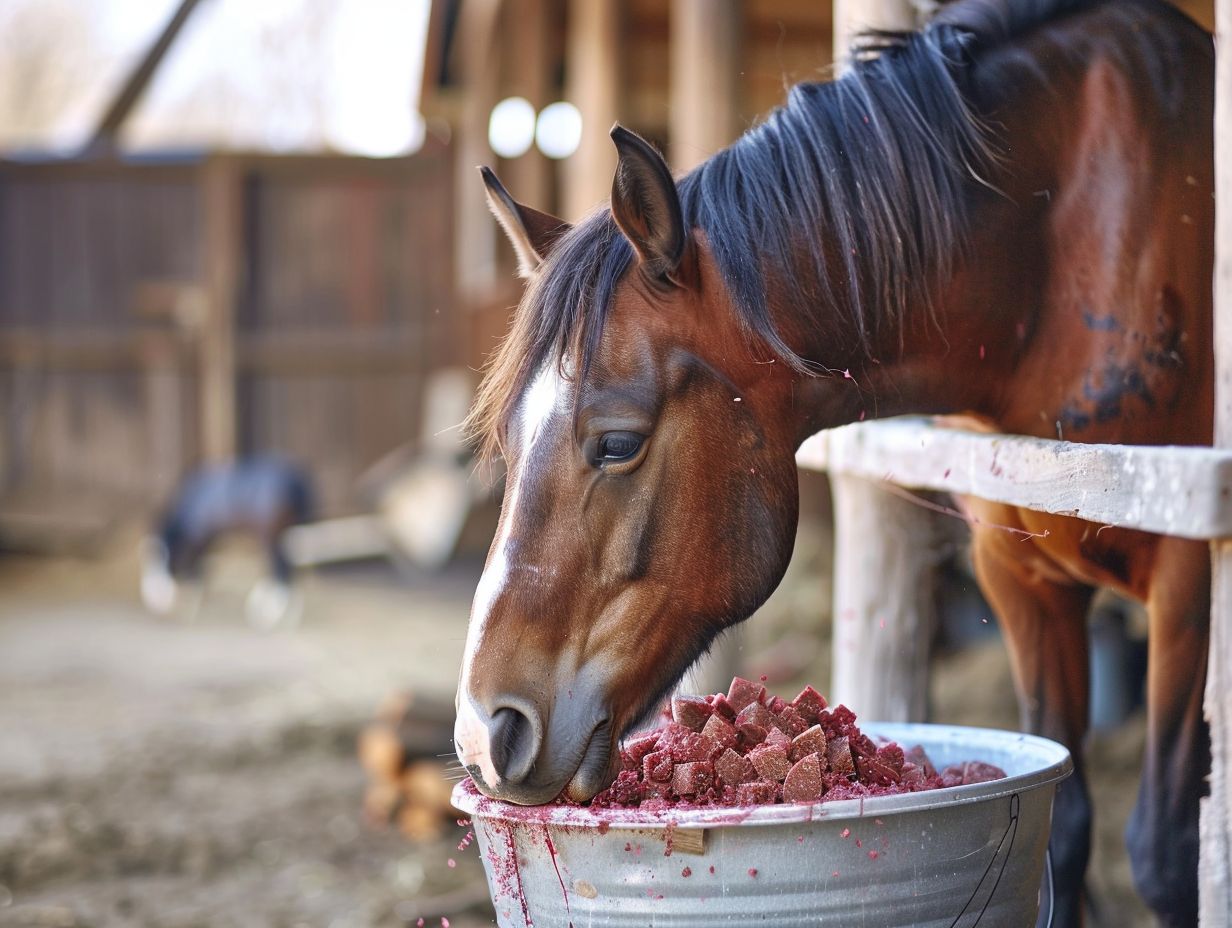
While beet pulp is a common choice for feeding horses, consider exploring alternative options that can also fulfill equine dietary requirements. Forage-based feeds, fiber supplements, and other feed sources are viable alternatives to beet pulp.
Forage-based feeds, such as hay and grass, serve as excellent substitutes for beet pulp by offering essential nutrients and roughage necessary for supporting the horse’s digestive system. These feeds provide a natural fiber source and can imitate the horse’s natural grazing tendencies.
Fiber supplements like alfalfa cubes or hay cubes present convenient ways to introduce fiber into a horse’s diet without requiring large quantities of traditional forage. Additionally, alternative feed sources like soy hulls, rice bran, or flaxseed can supply valuable nutrients and energy for horses.
Comparing Different Feed Options
When considering alternatives to beet pulp for horses, you should compare various feed options based on their nutritional profiles, feeding strategies, and compatibility with equine feeding practices and habits.
Some common feed choices for horses include hay, grain, and supplements, each offering unique benefits and considerations. Hay, a staple forage in equine diets, provides essential fiber and nutrients, promoting healthy digestion and maintaining gut health. Grains, on the other hand, offer concentrated energy sources but must be fed in moderation to prevent issues such as colic or metabolic imbalances. Supplements, like vitamins and minerals, can help fill nutritional gaps in a horse’s diet, enhancing overall health and performance.
Understanding how these feed options interact with a horse’s digestive system is crucial for ensuring optimal nutrient assimilation and supporting the animal’s well-being.
Frequently Asked Questions
Should I feed my Horse beet pulp?
This ultimately depends on your horse’s individual needs and dietary restrictions. It is always best to consult with a veterinarian or equine nutritionist before making any changes to your horse’s diet.
What is beet pulp and why is it recommended for horses?
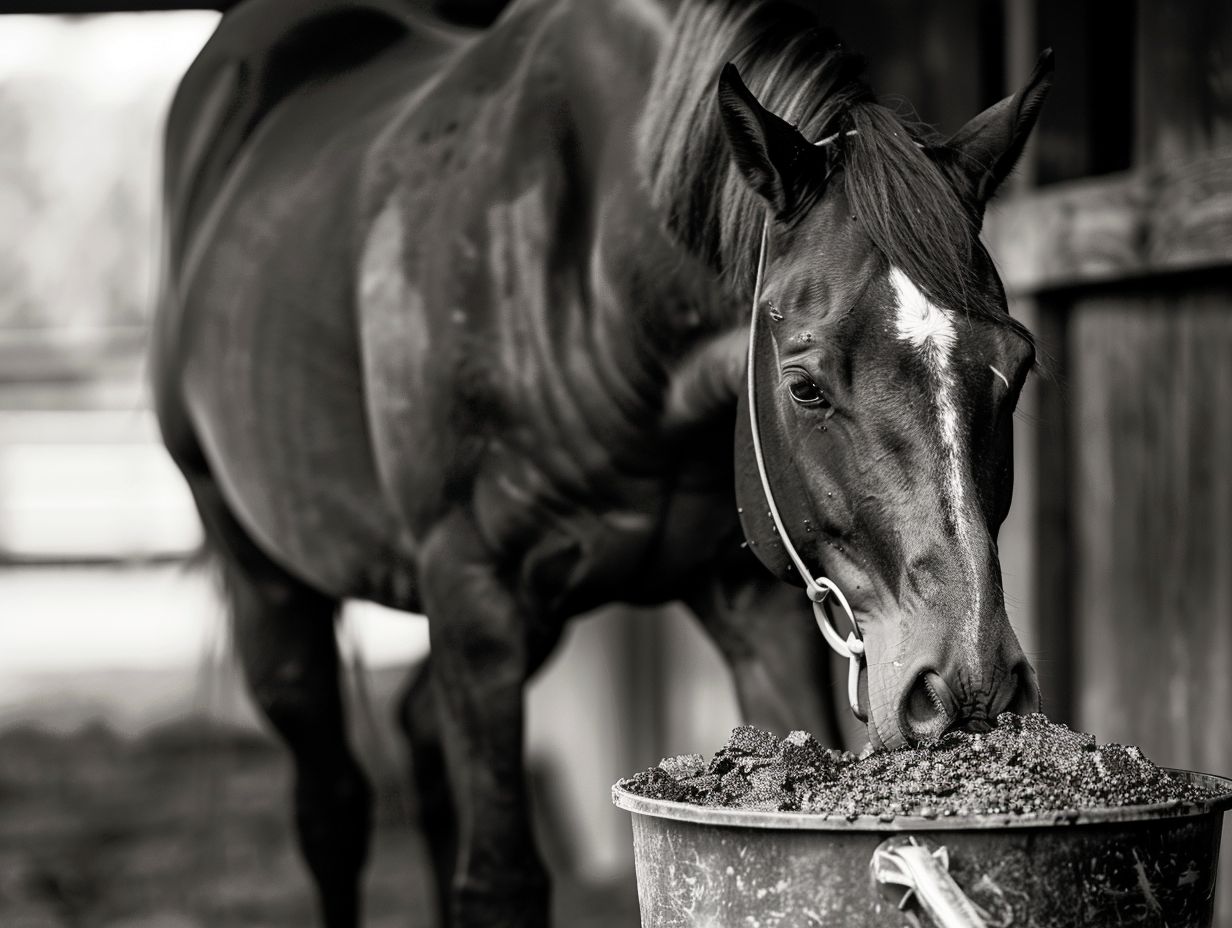
Beet pulp is a byproduct of sugar beet processing and is commonly used as a feed supplement for horses. It is high in fiber and easily digestible, making it a great source of energy for horses with high energy requirements or digestive issues.
How should I introduce beet pulp into my horse’s diet?
It is important to introduce any new feed gradually to avoid digestive upset. Start with small amounts of beet pulp mixed with your horse’s current feed and gradually increase the amount over several days.
Can beet pulp replace hay in my horse’s diet?
No, beet pulp should not be used as a replacement for hay in a horse’s diet. Hay is a crucial source of roughage and essential nutrients for horses. Beet pulp can be used as a supplement, but should not be the main source of forage.
Are there any horses that should not be fed beet pulp?
Yes, horses with certain health conditions such as insulin resistance or Cushing’s disease may not benefit from beet pulp and may even have negative reactions to it. Always consult with a vet before adding any new feed to your horse’s diet.
How much beet pulp should I feed my horse?
The amount of beet pulp to feed your horse will depend on their specific needs, but a general rule of thumb is to start with 1-2 pounds per day and adjust as needed. Always follow the recommended feeding instructions on the beet pulp product you are using.
